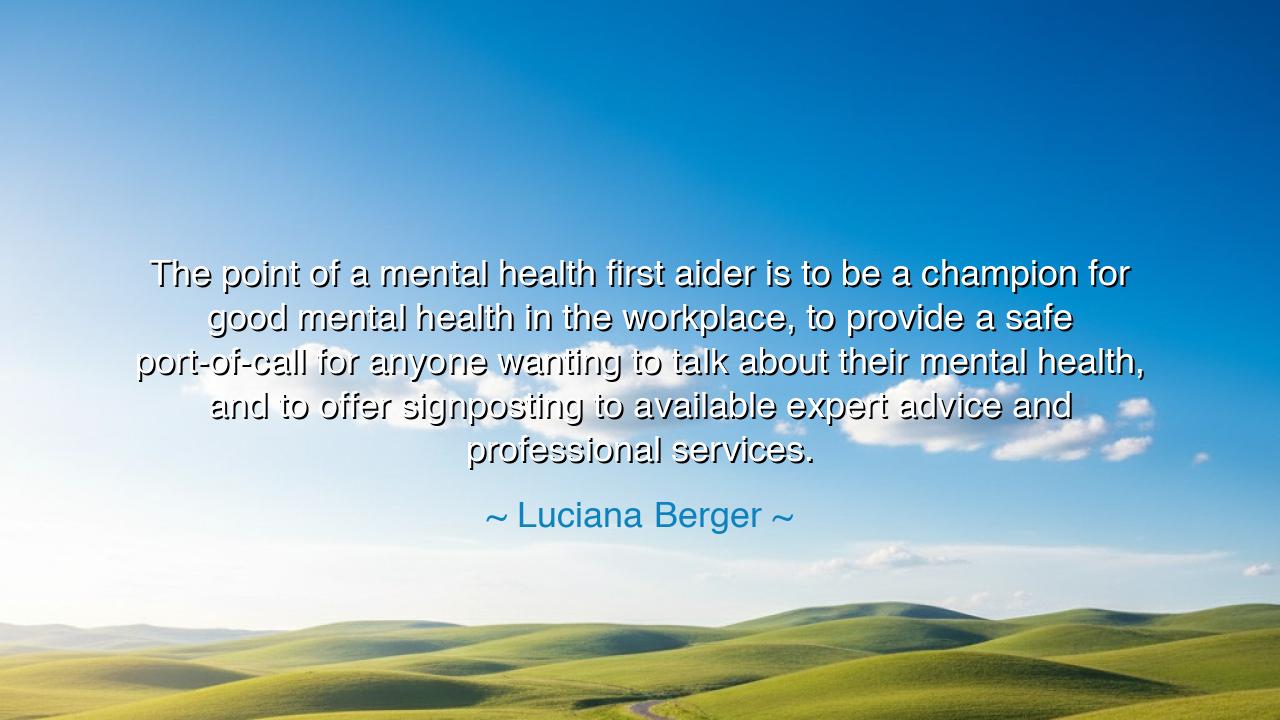
The point of a mental health first aider is to be a champion for
The point of a mental health first aider is to be a champion for good mental health in the workplace, to provide a safe port-of-call for anyone wanting to talk about their mental health, and to offer signposting to available expert advice and professional services.






“The point of a mental health first aider is to be a champion for good mental health in the workplace, to provide a safe port-of-call for anyone wanting to talk about their mental health, and to offer signposting to available expert advice and professional services.” – Luciana Berger
In these wise and compassionate words, Luciana Berger, a tireless advocate for public well-being, speaks to a truth both modern and timeless: that the health of a community depends not only on the strength of its bodies, but on the peace of its minds. Her message rises like a beacon in an age of relentless speed and silent suffering — a call to nurture empathy where once there was only endurance. She defines the mental health first aider not as a healer of wounds seen, but as a guardian of those unseen — one who tends to the invisible storms within the soul.
In the workplaces of the modern world, where ambition often outpaces compassion, the human heart can grow weary and unseen. The ancient philosophers taught that the city is only as just as the hearts of its citizens; likewise, a workplace is only as whole as the minds of those who dwell within it. Berger’s vision restores this sacred balance, reminding us that to care for others’ mental health is not a luxury or an afterthought, but an act of courage — an act of leadership. The champion for good mental health, as she names them, stands not above others, but among them — as a light in times of confusion, as a quiet listener when words fail, as a bridge between suffering and support.
The idea of a “safe port-of-call” evokes an image ancient mariners would understand. In their long voyages, the sailors who battled tempest and tide yearned for a harbor — a place of calm where they could mend their sails and hearts before returning to the sea. So too, in the storms of modern life, we need such harbors — people and places where judgment does not dwell, where fear is replaced with understanding, where one can simply speak and be heard. The mental health first aider becomes this harbor, not through power, but through presence — through the sacred act of listening.
History offers us many examples of those who served as unseen anchors in turbulent times. Consider Florence Nightingale, who walked among the wounded of war, not only tending their broken bodies but offering words that soothed their tormented minds. Her lamp became a symbol not of medicine alone, but of mercy. Luciana Berger’s call for mental health champions echoes Nightingale’s spirit: to stand beside the suffering, to illuminate the darkness with empathy and knowledge, and to guide the lost toward healing. Where Nightingale’s battlefield was physical, Berger’s battlefield lies within — in the quiet wars of anxiety, despair, and isolation fought within countless hearts.
And yet, Berger speaks not only to healers, but to all who labor in shared spaces. For she reminds us that mental well-being is not solely the work of doctors or counselors — it is the work of communities. The ancients said that the soul thrives when it is seen, and falters when it is ignored. Thus, to be a mental health first aider is to see the unseen — to notice when a colleague’s laughter dims, when fatigue cloaks the eyes, when silence hides a cry for help. It is to offer not pity, but companionship; not solutions, but signposts — guiding others toward the professional help they may need.
But there is a deeper wisdom still. Berger’s teaching is not only about support for others, but about cultivating a culture of compassion. In every workplace, every family, every community, there must be those who champion humanity above productivity — who remind us that we are not machines, but beings of thought, emotion, and spirit. To invest in mental health is to invest in endurance, creativity, and trust. The true first aider is not a rescuer, but a builder of resilience, teaching others to care for themselves and for one another.
Therefore, children of the future, let this lesson dwell in your hearts: listen deeply, act gently, and never underestimate the power of presence. You need no title to be a guardian of well-being. Be the one who asks, “How are you, really?” Be the one who offers stillness when others tremble. Learn the signs of distress, and learn the paths to healing, that you may guide others toward safety. For every kind word spoken in sincerity, every act of understanding, is a thread that binds a fractured soul back into the fabric of life.
And so, let Luciana Berger’s words become not just guidance, but a vow: to be champions for mental health, to create spaces of refuge in the midst of chaos, and to remember that caring for the mind is not weakness — it is wisdom. For the health of a people begins in the unseen places: in the kindness we extend, in the hearts we heal, and in the courage to say, “You are not alone.”






AAdministratorAdministrator
Welcome, honored guests. Please leave a comment, we will respond soon